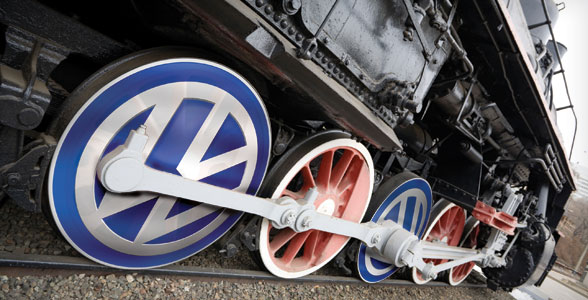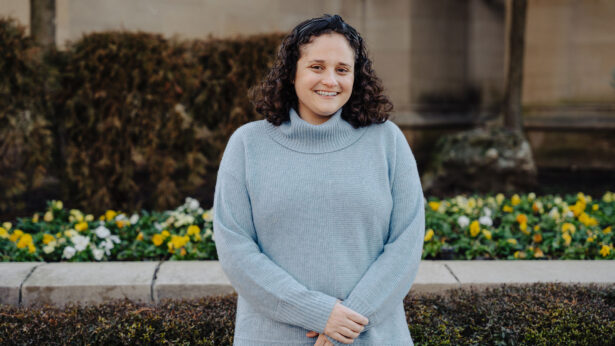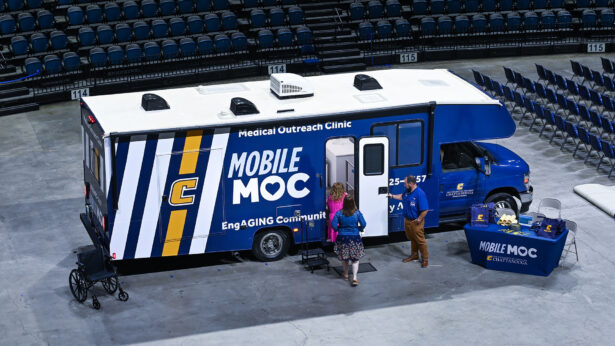By Cindy Carroll
The excitement continues to build in Chattanooga since the announcement in July that Volkswagen will build its North American assembly plant in that Tennessee city. UT Chattanooga was involved early on in wooing the German automaker to Tennessee.
“UTC is proud to have been involved in the pitch to the Volkswagen officials on behalf of our city,” says Chancellor Roger Brown. “We participated in the presentation to the VW team in March and April, when they were still considering three U.S. sites.”
Volkswagen representatives heard about UTC programs that enhance Chattanooga’s profile, such as research on fuel efficiency and electric-vehicle technology at the SimCenter: National Center for Computational Engineering, a new construction-management degree program launched in cooperation with Chattanooga State, and the 70 majors available at UTC.
Today the university is on track to work with the automaker to create learning opportunities for students. Volkswagen recently engaged UTC communication and marketing students in a “Ride and Drive” event that got them behind the wheels of Volkswagen vehicles and then gave them a chance to write about the experience. This academic adventure allowed the best submission to be published by a professional news organization.
“A well-educated workforce is a benefit to the entire community, not just Volkswagen, so events like this are a win-win-win,” says Jill Bratina, director of corporate communications for Volkswagen Group of America. “We are invested in the communities we call home and will be a reliable partner with the state of Tennessee and the city of Chattanooga. Long-term commitment is the hallmark of our success, and we look forward to a long and productive relationship.”
As Volkswagen explores partnerships with institutions of higher learning in Tennessee, Bratina explains that the process has just begun. “You might say that we are in our listening tour phase, in that it’s time to get to know the community and the colleges and understand what they offer on one hand and what their needs are on the other.”
When Volkswagen has defined its plan, the new dean of the UTC College of Engineering and Computer Science is ready to listen. Dr. Will Sutton has worked extensively with Mercedes-Benz US International Inc. in Tuscaloosa County, Alabama, and Honda Manufacturing in Lincoln, Alabama. As head of mechanical engineering at the University of Alabama, he helped facilitate a Mercedes connection that produced a large number of cooperative-education opportunities for students.
“The UTC College of Engineering and Computer Science will be looking to Volkswagen as they build their plan,” Sutton says. “We will work to align our programs to help meet their needs.”
Reports have circulated that Volkswagen took notice of research conducted by the SimCenter: National Center for Computational Engineering, which helped the transportation company U.S. Xpress Enterprises cut its fuel bills.
“At the University of Tennessee at Chattanooga, the SimCenter is able to provide analysis of the tire and wheel well of a vehicle that is not easy for just anyone in the world to do,” Sutton said. “These computational engineers show great capability. If you are doing world-class applications for businesses, you will get attention.”
UT Chattanooga’s Center for Energy, Transportation, and the Environment (CETE) is engaged in research on alternative fuels with an eye toward environmental issues. Dr. Ronald Bailey’s work with CETE was influential in bringing the U.S. Department of Transportation’s Hydrogen Road Tour 2008 to Chattanooga, an opportunity for consumers to test-drive the cars of the future. Volkswagen’s hydrogen model, the HyMotion Tiguan, was featured at the event, along with hydrogen-fueled vehicles from other manufacturers.
In this green environment lies a greener economy, according to the dean of the UTC College of Business, Dr. Richard Casavant. Using the examples of BMW Manufacturing in Greenville, South Carolina, and Mercedes-Benz in Alabama, Casavant anticipates the Chattanooga-area economy will experience dramatic changes in the next decade. Besides his duties at UT Chattanooga, Casavant serves on the Hamilton County Commission.
“Volkswagen will bring two thousand good-paying jobs with benefits, and it will make a positive impact. In both Greenville and Alabama, there is proof that the number of jobs actually increased over time,” Casavant says.
For instance, Casavant says the Spartanburg County BMW plant expansion last March is projected to result in 500 more jobs over the next few years. An encouraging report posted by the Greenville Area Development Corporation suggested “with economic impact studies showing that nearly three jobs have been created across the state’s economy for every one job at the plant, the investment could result in thousands of new jobs for South Carolinians.”
Volkswagen’s commitment to Chattanooga creates new urgency for preparing students and improving schools, Casavant said. As middle managers from Germany make the move to Chattanooga, they will need assurance that their children can seamlessly move from one education system to another.
Potential job seekers are also looking at the university in a different light. “We have already had inquiries from people who are pursuing an MBA, and they want to know if their credits will transfer. It’s an indication that people will be moving to pursue jobs here,” Casavant says.
Half of the courses UTC business students take are outside the college, Casavant said, giving them a breadth of academic experience. Those with a concentration in human resources, marketing, production management, and accounting and finance will have “a leg up in competing for these jobs. And I stress ‘competing,’ because there will be many people applying for these jobs,” Casavant says.
UT Chattanooga is ready to work with Volkswagen to focus new degree programs on the automaker’s most pressing needs so that graduates will be ready to take high-paying technologically advanced jobs in business, engineering, healthcare, education, and all of the fields that Volkswagen and other companies will be interested in when they move to Chattanooga, Brown says.
“We are happy to be bringing intellectual capital to the table for Volkswagen as we work toward expanding our relationship.”
UT: A Value-Added Partner
Strategic partnerships are a major priority for the statewide University of Tennessee. And when the university offered a partnership involving scientific expertise, research capabilities, and the resources of a national laboratory, the state of Tennessee scored a major economic win.
Volkswagen’s announcement in July that the company would base its U.S. operations in Chattanooga promised a boon to that city, and it proved the University of Tennessee’s ability to fulfill its economic-development mandate for the good of the state, according to UT executive vice-president and vice-president for research David Millhorn.
“The University of Tennessee and Oak Ridge National Laboratory together played a significant role in the recruitment of Volkswagen to Chattanooga,” Millhorn says. “They want to be in a place where they can have meaningful partnerships, and we answered the call.
“We demonstrated our science and engineering capabilities to Volkswagen’s executive team and provided assurances that we would be value-added partners as they develop their U.S. base of operations.”
“We opened our doors to key areas of collaboration—in materials science, computational science, supply-chain logistics, and biofuels—that are important to Volkswagen,” Millhorn says. “They were especially interested in our biofuels initiative because of previous work they have done in Europe with clean-energy research.
“We already are in a leadership position in biofuels research, and we showed them that the range of research opportunities here are second to none and that we could help provide a professional workforce with important engineering and scientific capabilities. Volkswagen understood that in coming to Tennessee, they were not coming into a scientific desert.”
As a managing partner of Oak Ridge National Laboratory, UT also is able to make the capabilities of the nation’s largest open-science laboratory available for collaboration. Availability of such resources enables Volkswagen to engage in more than just manufacturing.
“Any company is going to go where they get added value,” Millhorn says. “I don’t know the circumstances in Germany, but under the right conditions, they may find they’d like to do more research and development here. We’ve opened the doors for them to have that option.”
As the state’s land-grant university, UT is responsible for helping drive Tennessee’s economy. Contributing to the successful recruitment of Volkswagen is part of meeting that responsibility, Millhorn said.
“We view helping persuade them to locate here as part of fulfilling our mandate to work for the good of the state. If we help recruit or retain a company, then we make the state better, and that’s part of our charge to create a better economic climate for the state.
“Tennessee will get a lot of jobs out of this because, undoubtedly, there will be more related industries to follow as suppliers to the Volkswagen manufacturing site,” Millhorn says. “So through helping secure the Volkswagen opportunity, we have created additional opportunities to come.
“We partnered to show the availability of world-class opportunities by coming to Tennessee, and the result clearly is a huge win.”



